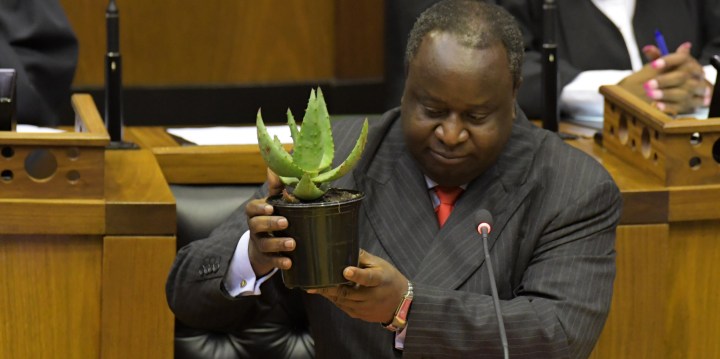BUSINESS MAVERICK: OP-ED
Medium-term budget leaves SA globally vulnerable

Tito Mboweni’s rhetoric and a failure to show any real progress in reducing government expenditure saw financial markets vote with their feet in response to the medium-term budget.
The market gave the medium-term budget framework a big thumbs-down, with the rand rapidly moving past the R15 a dollar mark as investors headed for the hills. Meanwhile, economic commentators bemoaned the government’s failure to make a dent in the R250-billion expenditure cuts it needs to make over the next three years.
The government’s perceived failure to make the tough decisions was also seen as putting the country in an exceptionally vulnerable global position that has, until now, been pretty forgiving of South Africa’s economic fiscal predicament.
Head of SA Investments at Investec Asset Management Nazmeera Moola didn’t pull any punches in her assessment of the mini-budget:
“It was a disaster. Clearly, the ANC is unable to make any decisions and this leaves South Africa vulnerable to any deterioration in the global economy.”
She would have liked to see the government make real progress on reducing the public sector wage bill, instead of the disappointing take-up of the voluntary retrenchment and early retirement packages offered to civil servants.
“Unfortunately, it seems unlikely that the financial markets will give the government the time to make these decisions. South Africa has been given the benefit of the doubt too many times in the past – and has yet to make any of those hard decisions. Is President Ramaphosa ready to take on unions and cut government employees? Can we realistically expect below-inflation wage increases from 2021/2022?” asks Moola.
Sanlam Investment economist Arthur Kamp also points out that so far the global environment has been favourable for the South African fiscus but that any increase in global interest rates would make the extent of the government’s balance sheet problems far worse.
Finance Minister Tito Mboweni’s mention of contemplating tax increases is not going to provide the silver bullet South Africa needs in order to start seeing the light at the end of the tunnel. There’s very little scope to increase taxes, and the revenues that would be raised through any tax hikes would hardly make a dent in the mountain of debt the public sector faces.
Government forecasts that gross debt to GDP, including the Eskom financing, could rise to more than 80% by 2027/28 from the now expected 60.8% for 2019/2020. The sharp climb in this number is evident in the 10 percentage point increase in just three fiscal years in the proportion of government debt to GDP.
Kamp says while Mboweni has targeted a primary budget balance within two years, this ignores the serious deterioration in the government’s balance sheet as a result of state-owned enterprise contingent liabilities.
Of major concern for Kamp is the size of the Eskom problem and the fact that although the government has shown it has an understanding of the extent of the problem and has expressed its intent to deal with it, there is no evidence yet of whether it will be able to effectively address it.
“The problems are so large and the near-term pressure just keeps building. The government at least needs to show they are prepared to respond to the expenditure side,” he says.
He would like to see Eskom renegotiate the coal contracts as soon as possible because these are material costs in running the power stations. But he is under no illusion that turning around Eskom will happen soon:
“It is still going to take a lot of time to fix Eskom even if we believe they will follow through.”
Kamp adds that there was no indication that the government will act on its reference in the Treasury paper to selling the income streams generated by Eskom’s power stations. The way that Public Enterprises Minister Pravin Gordhan’s paper, released this week, envisages moving ahead with the transmission of power in South Africa “relies on Eskom to increase efficiency, renegotiate contracts and deliver, something that its track record suggests it can’t achieve”.
Kamp says the risk that Mboweni brought up regarding Eskom encountering difficulties issuing debt could see the SOE weigh even more heavily on the government’s balance sheet going forward.
Though a disappointing mid-term budget, the consensus regarding the Moody’s Friday 1 November sovereign rating decision doesn’t seem to have changed, with the credit rating agency expected to maintain SA’s investment rating.
But there is a high likelihood that it could change South Africa’s outlook to negative, with a review coming between three and 18 months down the line. A surprise downgrade would have potentially dire ramifications for the financial markets, already buffeted by the volatile risk-on, risk-off environment that has prevailed for some time.
Beneath all the rhetoric, Mboweni was effectively imploring the South African public to put their confidence in the government’s determination to address the looming debt crisis it faces.
While the leadership commitment is undoubtedly there in the form of the single-mindedness of the Ramaphosa-Gordhan-Mboweni trio to put South Africa’s financial trials and tribulations behind it, the political cross-currents between all the role players make any of the hard decisions needed to turn around the alarming debt-to-GDP trajectory a risky gambit. BM


















 Become an Insider
Become an Insider